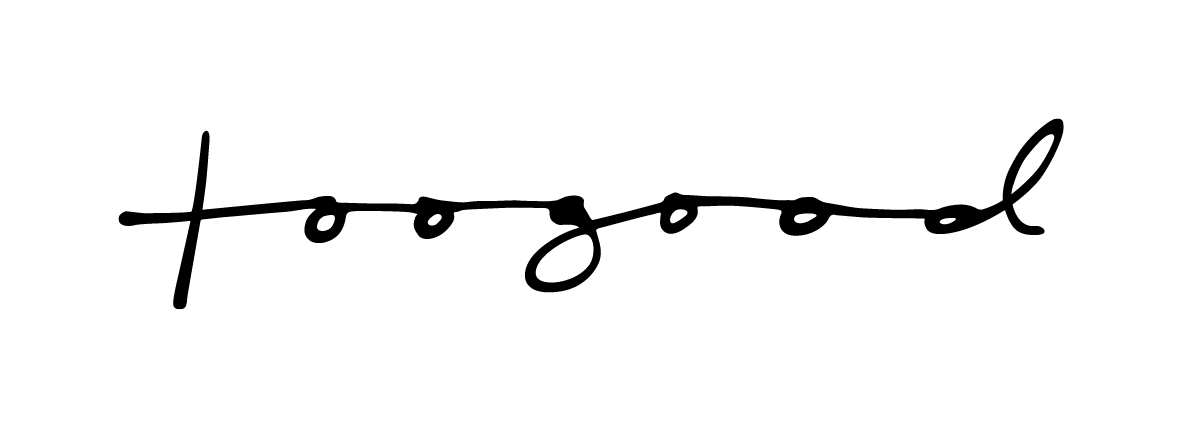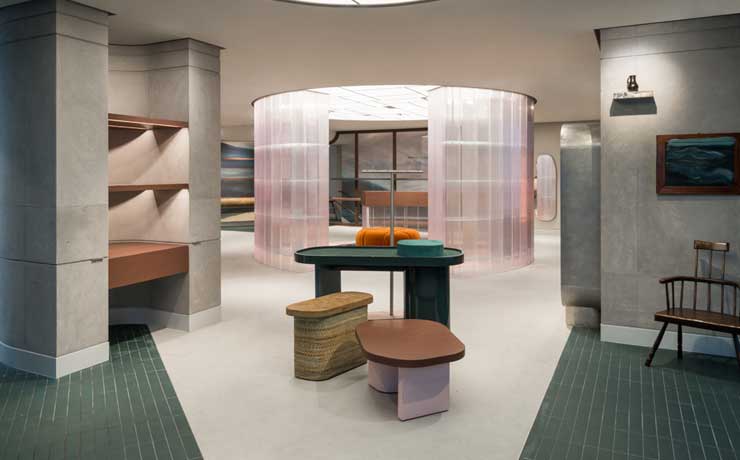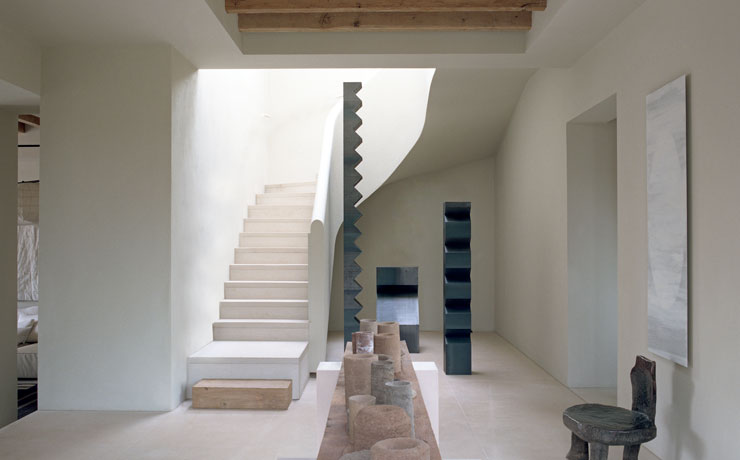2017年4月
ウォールストリートジャーナル
フェイ・トゥーグッドの新スタジオ特別ツアー
ナタリア・ラクリン
写真家 フェリックス・オデル
トゥーグッドの折衷的な新しいスペースは、彼女が単一の種類の作品や単一の種類のアーティストとして定義されることを拒否していることを示しています。
フェイ・トゥーグッドの2012年の古い写真では、プラチナブロンドの髪にヒョウ柄のミニドレスを着て、かなり厳しい表情でカメラを見つめている。彼女はちょうどオープニングセレモニーとコラボレーションし、このファッションブランドのロンドンでのポップアップストアの家具とインテリアをデザインしたばかりだった。それから約5年後、トゥーグッドはロンドンのショアディッチ地区にあるビクトリア朝のタウンハウスに新しく作ったアトリエの2階で、自分でデザインした椅子に座り、ベージュ系の服を着ている。タンのフラットソールのブーツ、しっかりしたクリーム色のズボン、クリーム色のフェルトコートだ。髪は今では自然な茶色で、表情はより柔らかくなっている。「私はたくさんのアイデンティティを作ってきました」と、今年1月に40歳になったトゥーグッドは言う。「髪型も服装も、私のバージョンもいろいろありました。私はその時作っている世界に足を踏み入れる傾向があり、その構築物の中に深く入り込んでいます」
トゥーグッドの最新の小宇宙は、控えめな大きさの箱型の3階建ての建物で、ほこりっぽい黒いファサードと、上に行くほど狭くなる間取りで、文字通りの小宇宙だ。彼女がスタジオと名付けた「ハウス オブ トゥーグッド」は、イーストロンドンの6ブロックにわたる超高級化地区、レッドチャーチ ストリートの一角にある。トゥーグッドと彼女の「陽気なはみ出し者集団」(再起をかけた建築家、解放された工業デザイナー、アートスクールの救援者からなる13人のチーム)は、昨年の秋、荒廃した状態だった新しい本社ビルを総合芸術作品に作り替えた。この春からは、ギャラリー、ショップ、ショールーム、ワークショップとして時折一般公開される予定だ。個性的なビンテージ品(eBay で見つけた古い木製の椅子、オランダの運河の荷船から再利用したキッチンシンク)が、ツールのようなハンドルが付いたエレガントなスペードチェアや、東京の E&Y ショールーム用に作られたぽってりとしたストーンウェアのポットなど、スタジオのオリジナル作品と混ざり合っています。この無礼な組み合わせは、過去 10 年間にトゥーグッドが築き上げてきた急成長中の美的帝国を触覚的に要約しています。実体のある製品と同じくらい、トゥーグッドの目と想像力は、彼女の人気のシグネチャーとなっています。
家の奥の聖域は 2 階にあります。スタジオの日常業務を行う小さなオフィスと、トゥーグッドがローリー・ポリーと一緒に 1 日の大半を過ごす隣の応接室です。ふっくらと落ち着いた雰囲気のこの 6 点のファイバーグラス家具コレクションには、トゥーグッドが座っている低いチャコール色の椅子も含まれています。アイスクリーム スクープのような座席と、今にも動き出しそうな 4 本の巨大な脚を持つこの椅子は、家具というよりは、空間に溶け込んでいます。
この親密な応接室の周囲には、エルメス、ケンゾー、コム デ ギャルソンなどのクライアント向けの幻想的なインスタレーションから、イビサのヴィラやメイフェアの雰囲気のあるアパートのインテリアまで、トゥーグッドが手がけたすべてのプロジェクトの記念品が入ったアーカイブ ボックスが積み重ねられたスリムな棚があります。彼女はまた、陶芸、テキスタイル、ドア ハンドルも手がけており、家具コレクションのポートフォリオも増え続けています。トゥーグッドが「アサンブラージュ」と呼ぶこれらの作品は、オブジェクト同士の関係とそれらが展示される空間を強調しており、彼女は形状と素材を実験してきました。シリーズごとに、繊細さは記念碑的なものに取って代わられ、イングリッシュ プラタナスは金属製のセキュリティ メッシュに置き換えられました。
トゥーグッドの作品には、彫刻的な品質、伝統工芸への理解、強い物語性といった一貫したテーマが見られるものの、彼女は特定の媒体というよりは、その幅広い実践で知られている。彼女をデザイナーと呼ぶのは、正式なデザイナー教育を受けていないこともあり、近道のように感じられる。2月にトゥーグッドのアメリカ初の個展を開催したニューヨークのフリードマン ベンダ ギャラリーのマーク ベンダは、彼女の器用さを「子供が両手で絵を描くのを見ている」ことに例える。「彼女がこれらすべての分野を織り交ぜるやり方で、同じようなことをする人を私は見たことがありません」とベンダは言う。「彼女のアプローチには子供らしい性質があり、とても新鮮に感じます。」
実際、トゥーグッドによると、彼女の想像力を刺激したのは、イギリスの田舎にある絵のように美しいラトランド郡で過ごした、やや孤立した幼少期(ほとんどの時間を屋外で過ごした)だったという。マックス・ラム、マルティーノ・ガンパー、ベサン・ローラ・ウッドなど、同世代の多くがロイヤル・カレッジ・オブ・アートを卒業したのに対し、トゥーグッドは、威厳のある大学のカウンセラーに彫刻の学位取得を止められた後、ブリストル大学で美術史を学ぶことになった。「私は、自分が関わるすべての分野で、少し部外者のような気がしてきました。私は通常のルートを通ったことがないのです」とトゥーグッドは言う。彼女の視覚教育は、由緒あるイギリスの住宅雑誌「ワールド・オブ・インテリア」で過ごした8年間も続き、トゥーグッドはそこでスタイリストとしてスタートし、後にインテリア編集者になった。「トレンドやファッションではなく、美学と人々の暮らし方に関するものでした」と彼女は回想する。「それが本当に私の心に残ったのです」
2008 年に出版界を去ったとき、壮大な計画はなかった。ただ「立体的な物体や空間、より永続的なものを創りたいという欲求」があっただけだと彼女は言う。WOI の広告のみで構成されたポートフォリオと、たゆまぬ努力の姿勢で、トゥーグッドは北ロンドンの自宅のキッチンテーブルに店を構えた。
10年近く経った今、そのテーブルは1階にある新しいスタジオの広々とした居間の中央に置かれています。淡いグレーの壁には洋服掛けが並んでおり、そこにはトゥーグッドのワークウェア風ファッションレーベル「トゥーグッド」の2017年春夏コレクションの作品がずらりと並んでいます。トゥーグッドは2013年、パターンカッターである妹のエリカと共同でこのレーベルを設立しました。ボリュームがありながらもシンプルでジェンダーレスなデザインは、贅沢な素材で作られており、好評を博しています。取り扱い店舗には、ロンドン、東京、ニューヨークのドーバーストリートマーケットやパリのレクレルールなどがあります。今年、姉妹は、将来有望な若手ブランドを支援する権威ある賞である、英国ファッション協会/ヴォーグ・デザイナー・ファッション・ファンドの最終候補に選ばれています。
トゥーグッドのファッションへの進出が、インテリアとその中身を基盤としたキャリアからの逸脱のように聞こえるとしても、むき出しの壁に掛けられた襟なしの白いブラウスと糊の利いたエプロンスカートは、それが決してそうではないことを証明している。これらの衣服は、良い椅子と同じくらい具体的で、トゥーグッドの家自体と同じくらい居住可能である。「この家は、私たちが着ているもの、座っているもの、そして私たちが住んでいる空間、それらはすべて同じ言語の一部であることを、私自身だけでなく他の誰にとっても証明しています」とトゥーグッドは言う。
今月、トゥーグッドのスタジオはミラノで毎年開催されるサローネ デル モービレ家具見本市でいくつかのプロジェクトを発表します。その中には、CC-Tapis の手作りラグ コレクション、Matter のグラスファイバーとアルミニウムの照明シリーズ、Calico Wallpaper の壁紙シリーズなどがあります。しかし、トゥーグッド自身は見本市についてしばしば葛藤を感じており、今年はロンドンに留まることも検討しました。「ミラノを回ると、もう作品を作る必要はないような気がして帰ります。すでにたくさんの作品が出回っていて、その多くは素晴らしいものです」と彼女は言います。「私は他の人の作品をとても尊敬していますが、創作に自信を持てるようにするには、自分を閉じ込めなければなりません。」
トゥーグッドは、オフィスという限られた空間の中では、明らかにくつろいでいる。彼女のチームのメンバーは、しばしば靴下を履いて歩き回っており、ここで感じられる心身の快適さ、つまり、心と目の快適さがさらに強調されている。スタジオは、仕事場や芸術的世界のショーケースを超えた、家のような場所になっている。「今の私の世界は、私たちが誰で、何で、なぜここにいるのかという本質に立ち返ることに大きく関係しています」とトゥーグッドは言う。「私はただ、それを理解して、それが存在する小さな空間を作ろうとしているだけです。」
記事全文は、 こちらから現地でご覧ください。


